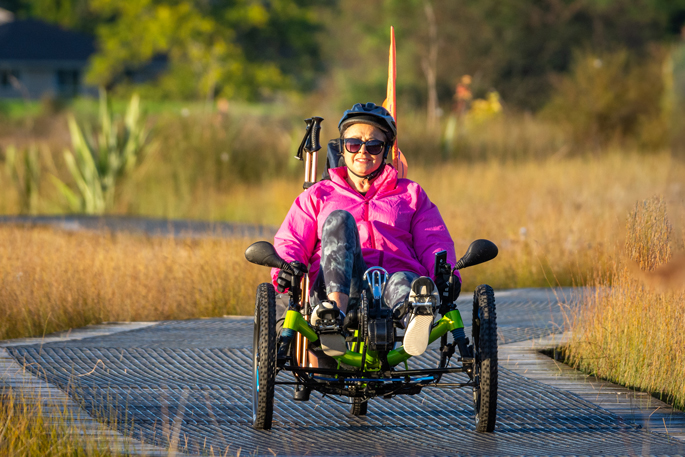When fate cruelly conspired to close one door on Dr Sharon De Luca, a couple of security doors slid quietly open for her. And a bit of normality crept through.
“I have my independence back,” says Dr De Luca. “I have more time in the mornings, and I am not all flustered arriving at work.”
And all because she scored a fob key and a bike park in the Tauranga CBD.
“It’s very exciting.”
It’s the ‘Bike Stop’ on Grey St – the first covered and secure bike and scooter parking facility in the CBD – another incentive for car-addicted Tauranga City workers to embrace alternative transport options.
And it’s changed a life. “Very cool,” says Dr De Luca.
To appreciate that ‘cool’ and why the bike park is important to her, it helps to understand her past.
Four years ago she was diagnosed with a disease of the central nervous system – the name of which, is as long, menacing sounding, and as complicated as the disease itself. Autoimmune glial fibrillary acidic protein astrocytopathy, or GFAP astrocytopathy for short.
“Very rare, very un-studied,” says Dr De Luca. So ‘un-studied’, her neurologist has been learning alongside as she navigates the disease. “Probably only a couple of cases in New Zealand.” Not that this outdoorsy-kind-of-woman wants, or needs, that kind of celebrity.
Reduced mobility
Initially the ‘lurgy’, as she jokingly understates it, affected the optic nerves in both eyes, then her mobility, her spatial awareness and cognitive ability.
“I am left with reduced mobility now.” She gets about with the aid of hiking poles.
The marine scientist can’t do field work anymore.
“Very frustrating!” But she can still write expert marine ecology reports. She can’t play her beloved squash anymore. “I used to be pretty good.”
But she can still prepare expert evidence for the environment court.
Her ‘bio’ says the scientist enjoys a complex and challenging ecological project. But she struggled with a challenge that arose every day just before getting to her office at Boffa Miskell, the environmental consultancy in Grey St.
Where to park her flash $22,000 recumbent electric bike? A bike with a semi-reclined seat and the pedals in front rather than below. A sturdy three-wheeler, which removes some of the balance issues of a traditional upright bike.
But her condition made it impossible for Dr De Luca to manhandle and manoeuvre the bike through two doors into a bike park in her building – it was achievable but a hassle.
“If I got the right angle I could squeeze it into the lift and take it to my office on the fifth floor.” Again, a real bother to start every working day.
But Dr De Luca thrives on her boardwalk ride through the mangroves on the Waikareao Estuary every day – the salt marshes and the bush fringes along the Daisy Hardwick walkway. It’s probably why she’s known to some as the ‘mad mangrove woman’.
“I love being out in the open. It’s my passion.” She could drive but chooses to ride. That’s what city fathers, the transport planners want to hear – the will to get out of cars.
78 bike and scooter spaces
That’s why Tauranga City Council partnered with locally-owned business, Basestation, the co-working space outfit.
They leased a vacant shop at 28 Grey Stand fitted it out with 78 bike and scooter spaces, powerpoints for charging e-bikes and scooters.
And lockers. All safely behind double security doors and monitored by CCTV cameras. It’s open Monday-Friday from 5am to 10pm.
To gain access riders can register on the Basestation website and they’ll get an access code, or fob key. Just $1 a day to assist with managing the facility. Beats the cost and bother of carparking, or a bus fare.
“The city centre is transforming,” says TCC’s Gareth Wallis.
“So it’s important we create a future which supports a wider range of sustainable transport choices.”
What our transport planners are saying is they’re making it easier for people to bike or scooter into the city to work. And a big part of that is having end-of-trip facilities like Bike Stop.
So easy!
And, it doesn’t end there though – plans are underway for some free and covered bike stands for people who want to visit the city centre to just shop, eat or take in a movie.
It’s more significant than all that for Dr De Luca. It’s a life-changer.
“Bike Stop makes it so easy to go to work on your bike, get some exercise and be in the environment.” It tells her we need to get out of our cars. “I hardly use my car at all now.”
Bike Stop has started slowly – just 15 cyclists a day. But word is getting out, and it had its busiest day just last week. It deserves to be used by more people.

